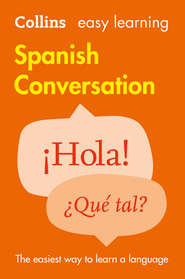скачать книгу бесплатно
To ask more specifically about the menu, you can use ¿Qué…? (What…?).
What…?
If you want to ask the price of something, you can use ¿Cuánto vale…? (How much is…?).
How much is…?
ASKING FOR THINGS (#ulink_3526652e-ba6e-5aa0-af66-75403b4e64b2)
If you haven’t already got a reservation at the restaurant where you’re planning to eat, you’ll need to ask if there’s a table you can have. ¿Tienen…? is the right verb form to use whenever asking if something is available in hotels, restaurants and shops. It is from the verb tener. For more information on tener, see here (#litres_trial_promo).
Have you got…?
¿LO SABÍAS?
Of course if you have made a reservation, instead of asking if there’s a table free, you’ll be able to say he reservado una mesa para dos a nombre de… (I’ve booked a table for two in the name of…).
To say what you’d like or what you want, you can use either quisiera or quiero (I’d like). They are both from the verb querer. For more information on querer, see here (#litres_trial_promo). To attract the waiter’s attention, you just need to say ¿Puede venir, por favor? (Can you come over?) or ¡Oiga, por favor! (Excuse me, please!).
I’d like…
¿LO SABÍAS?
To a Spanish ear, you may sound unnatural, overformal and foreign if you pepper your requests with por favor the way we use please in English. So don’t overuse it, and don’t keep repeating it.
To say what you’ve chosen, you can use voy a tomar (I’ll have).
I’ll have…
¿LO SABÍAS?
If you haven’t made up your mind what you want to eat when the waiter appears with a notebook, you’ll want to send him or her away temporarily. To do this you can say todavía no he decidido (I’m not ready to order yet) or todavía no hemos decidido (we’re not ready to order yet).
When you’re at your table, a very natural way to ask the waiter for what you want is by using ¿Me trae…? (Can I have…? or Can you bring me…?). If you’re being served at the bar, use ¿Me pone…? for Can I have?.
Can I have…?
You can also use ¿Puede…? (Can you…?) or ¿Podría…? (Could you…?) when asking for things. They are both from the verb poder (to be able). For more information on poder, see here (#litres_trial_promo).
Could you…?
Would you mind…?
SAYING WHAT YOU LIKE, DISLIKE, PREFER (#ulink_73f3803f-0a11-524a-82f8-1c57c98edf3c)
When you’re eating out, you may want to talk about what you like and dislike when it comes to food. Don’t forget that the Spanish for I like works rather differently from English. You use me gusta with singular words and me gustan with plural ones. And it’s the same story with me encanta and me encantan (I love). To say what you don’t like, use no me gusta or no me gustan (I don’t like).
I like…
I don’t like…
Do you like…?
¿LO SABÍAS?
Note that in Spanish when you talk about things that you like in general, you need to say the equivalent of I like the gazpacho, I don’t like the ham even though in English it’s I like gazpacho and I don’t like ham.
I’d rather…
If you have specific dietary requirements, you can sometimes describe them using soy (I’m).
I’m…
MAKING SUGGESTIONS (#ulink_329f16f4-a9e2-53d0-8625-e7bc0ca21cc3)
You may want to make suggestions to Spanish-speaking companions. One way to do this is to use podemos and podríamos (we can and we could). podemos and podríamos come from poder. For more information on poder, see here (#litres_trial_promo).
We could…
To ask a friend or young person if they would like something, you can use ¿Quieres…? (Would you like…?). Alternatively, you can use ¿Te apetece…? (Do you fancy…?) with a singular noun and ¿Te apetecen…? with a plural one.
Would you like…?
Another way of making a suggestion is to use ¿Por qué no…? (Why don’t…?).
Why don’t…?
You could also try making suggestions about where or what you should eat using ¿Qué te parece si…? or ¿Qué tal si…?, which both mean How about…?
How about…?
¿LO SABÍAS?
Don’t use un or una in front of otro and otra (another). To say another glass of wine, for instance, you just say otra copa de vino.
To ask someone what they think, use ¿Crees que deberíamos…? (Do you think we should…?).
Do you think we should…?
What would you recommend?
COMPLAINING (#ulink_df9b1569-9ce3-5217-ac5b-f0824294b089)
If you’re unfortunate enough to have something to complain about, remember that estar is the verb to use to talk about temporary, changeable qualities. For more on ser and estar, see here (#litres_trial_promo).
…is…
You may want to say that there’s too much of something or that there isn’t enough of something. You can use demasiado and suficiente to do this.
…too much…
¿LO SABÍAS?
Don’t forget to change the endings of demasiado and suficiente to go with the noun they describe. For more information on agreement of adjectives, see here (#litres_trial_promo).
You can also use demasiado to mean too. In this case, the ending always stays the same.
…too…
You can say that something has run out by using no queda… (there isn’t any…left).
There isn’t any…left
LISTEN OUT FOR (#ulink_e9047b9f-193e-5335-a604-4e7dc1f0f7e9)
Here are some of the key phrases you may hear when going out for a meal.
Lifestyle Tips (#ulink_5a74fefd-996d-5a40-803f-fe0a87856285)
• Spaniards usually don’t have lunch till around two or three and may not start their evening meal till nine, ten or even later. So it isn’t advisable to go out for dinner too early. If you can’t wait, however, you will find bars serving tapas
Вы ознакомились с фрагментом книги.
Для бесплатного чтения открыта только часть текста.
Приобретайте полный текст книги у нашего партнера:
